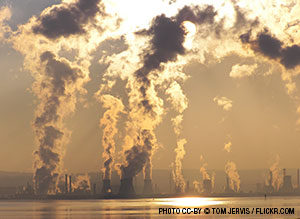EMBARGOED FOR RELEASE: November 21, 2017 6:01 AM
New Report Takes Hard Look at Chemical Giant’s Trail of Pollution
WASHINGTON, DC/BRUSSELS—Facilities owned by the massive chemical corporation Ineos are responsible for scores of serious health and safety violations across the globe, a troubling record that should move United Kingdom leaders to slam the brakes on the company’s push to begin fracking in the United Kingdom. Ineos has never drilled a commercial gas or oil well, and its indifferent safety record in chemical plants justifies blocking its foray into fracking.
A new issue brief from Food & Water Watch and Food & Water Europe examines Ineos plants in the UK, and across Europe and the United States. The company’s 71 facilities in 18 countries are responsible for a vast array of accidents, chemical leaks, fires and explosions, and substantial air and climate pollution.
“From towering chemical fires in Germany to toxic air pollution in Scotland and plastic pellets littering our oceans, Ineos’s safety record is appalling,” said Wenonah Hauter, executive director of Food & Water Watch. “The company is also a climate disaster waiting to happen—benefiting from fracking in the U.S. while planning to bring the dangerous practice to the United Kingdom. This company’s plans have been met with a passionate, committed grassroots movement, and political leaders are beginning to understand that the right response to fracking is to stop it before it starts.”
The company’s Grangemouth facility in Scotland is the largest industrial site in in the country, and the hub for Ineos’s global fracking ambitions. It can manufacture one million tons of chemicals per year, and has repeatedly received low environmental ratings by Scottish regulators. The plant is Scotland’s single largest emitter of carbon dioxide.
The story is similar at other Ineos facilities, which have amassed a record of fires, explosions, and chemical leaks. The Ineos facility in Cologe, Germany was the site of a massive fire in 2008, and there have been a series of high profile accidents elsewhere—a major oil leak in Norway, a number of chemical leaks in France, long-running controversies over chemical dumping in Italy, and the release of toxic gas that resulted in the hospitalization of workers in Belgium.
Over a quarter of Ineos’s facilities are located in the United States, where the company’s awful record continues. The report shows that between 2014 and 2017, 12 of the company’s 14 plants in one EPA database were failing to comply with a major environmental regulation for at least one three-month period.
Already a chemical industry giant, Ineos has been expanding into fossil fuel infrastructure and drilling, with a plan to bring hydraulic fracturing or fracking to the United Kingdom.
From beginning to end, Ineos’s business model represents grave threats to clean air and water. The company relies on fracked hydrocarbons from Pennsylvania and Ohio, which delivers immediate negative impacts in the communities near drilling sites. These dangerously explosive materials must be transported via major pipelines, like the Mariner East 2 under construction across Pennsylvania, drilling for which has already caused dozens of spills and several cases of water contamination. The materials are shipped across the Atlantic Ocean to the plastics and chemical manufacturing sites, which contribute further environmental threats to the air, water and public health.
“The Ineos vision for the future is a disaster for clean air and water, and a disaster for the climate as well,” said Hauter. “At a time when the entire world must be moving off fossil fuels, Ineos represents a series of dangerous gambles that will take us backwards.”
Contact:
Andy Gheorghiu, Policy Advisor, Food & Water Europe, agheorghiu[at]fweurope.org



